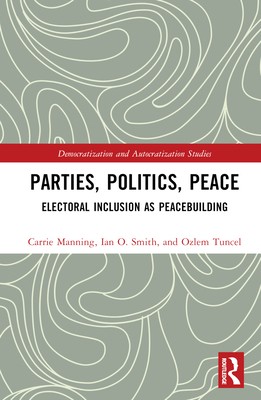
- We will send in 10–14 business days.
- Author: Carrie Manning
- Publisher: Routledge
- ISBN-10: 1032318937
- ISBN-13: 9781032318936
- Format: 15.6 x 23.4 x 1.4 cm, hardcover
- Language: English
- SAVE -10% with code: EXTRA
Reviews
Description
This path-breaking book uncovers the important, under-appreciated role of armed opposition groups turned political parties in shaping long-term patterns of politics after war.
Based on an empirically grounded and theoretically informed retrospective on nearly thirty years of post-conflict democratic state-building efforts, it examines whether this practice has contributed to peace and finds that engaging post-rebel parties in electoral politics has proven to be a viable long-term strategy for bringing political stability, that disparate post-rebel parties from different political contexts invest heavily in electoral politics and that few post-rebel parties actively seek return to civil conflict as a solution after becoming a political party.
This book will be of key interest to scholars, students and practitioners in democracy, governance, elections, political parties, post-conflict peacebuilding, and more broadly to international relations, comparative politics, and regional politics.
EXTRA 10 % discount with code: EXTRA
The promotion ends in 17d.19:27:01
The discount code is valid when purchasing from 10 €. Discounts do not stack.
- Author: Carrie Manning
- Publisher: Routledge
- ISBN-10: 1032318937
- ISBN-13: 9781032318936
- Format: 15.6 x 23.4 x 1.4 cm, hardcover
- Language: English English
This path-breaking book uncovers the important, under-appreciated role of armed opposition groups turned political parties in shaping long-term patterns of politics after war.
Based on an empirically grounded and theoretically informed retrospective on nearly thirty years of post-conflict democratic state-building efforts, it examines whether this practice has contributed to peace and finds that engaging post-rebel parties in electoral politics has proven to be a viable long-term strategy for bringing political stability, that disparate post-rebel parties from different political contexts invest heavily in electoral politics and that few post-rebel parties actively seek return to civil conflict as a solution after becoming a political party.
This book will be of key interest to scholars, students and practitioners in democracy, governance, elections, political parties, post-conflict peacebuilding, and more broadly to international relations, comparative politics, and regional politics.


Reviews